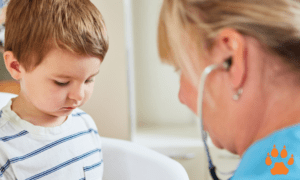By Dr. Veja Tillman, DVM
Whether it is the next hurricane or other natural disaster, or it is man-made, having a plan for your pets must be included with your family’s emergency plan. But where do you start? What will you need and how much?
From veterinary records to their favorite toys, this checklist will give you a basic idea of what to do to make sure your pets are disaster-ready.
Pet Identification and Medical Records: Maintain up-to-date identification/description of your pet, photos of you and your pets together (selfies!) and medical records for all your pets. A tag with a current and reliable phone number and an updated pet license and copies of vaccinations and 3-6 months medical history (paper or digital) will be helpful in case you are separated from your pet or your pet is injured. Consider microchipping your pet (a permanent form of id). Microchipping is one of the preferred methods of identifying your pet(s). Most shelters and veterinarians have universal microchip readers and access to the pet finder database. Remember to keep your pets microchip registration up to date.
Emergency Contact Numbers: Prepare this list now before a disaster strike. Include addresses and 24-hour contact numbers for you, close family members (outside of the disaster area, if available), your pet’s veterinarian and pharmacy contact information for refills. Keep one copy near your telephone and one copy in your pet’s emergency kit.
Prepare a Pet Emergency/Disaster Kit: This is a collection of basic supplies that you may need in the event of an emergency. Food and water, medications (enough for at least 7-14days for each pet), carriers and leashes, familiar blankets and favorite toys and a copy of your pets’ vaccination and medical records should also be included. Your pet’s disaster kit should be assembled in an easy-to-carry, waterproof tote. It should be stored in an easily accessible area away from extreme temperature changes. Keep this kit in a designated place and have it ready in case you have to leave home/work quickly. Make sure all family members know where the kit is kept.
First Aid Kit: This should contain the basic items needed for minor injuries. Pre-made kits are available at local pharmacies as well as online. Consult your veterinarian when developing a first aid kit that would be best suited for your pet.
Evacuation: If you evacuate, take your pets with you. Do not leave pets alone. Scared pets may panic and be at risk of serious injury during a disaster. If it is unsafe for you, it is unsafe for your pets. Most human shelters do not allow pets. Map out locations along your evacuation route that allows pets. Pet-friendly hotels, boarding kennels, vet offices and friends and family are great choices for shelter for your pets outside of your evacuation area.
Remember to update your pet’s disaster plan/Kit. Re-evaluate your pet’s needs (at least twice yearly) and update your contact information and your pet’s Emergency kit based on their current requirements.
June is Disaster Awareness and Microchip Your Pet Month. Contact us today to schedule a microchip for your pets!
ABOUT DR TILLMAN
Dr. Tillman is a 2002 graduate of Tuskegee University School of Veterinary Medicine. Her veterinary practice and work experience focuses on health and wellness of pets in Southwest Florida. She is the owner of Just 4 Pets Wellness Center and can be reached at 239-270-5721.








